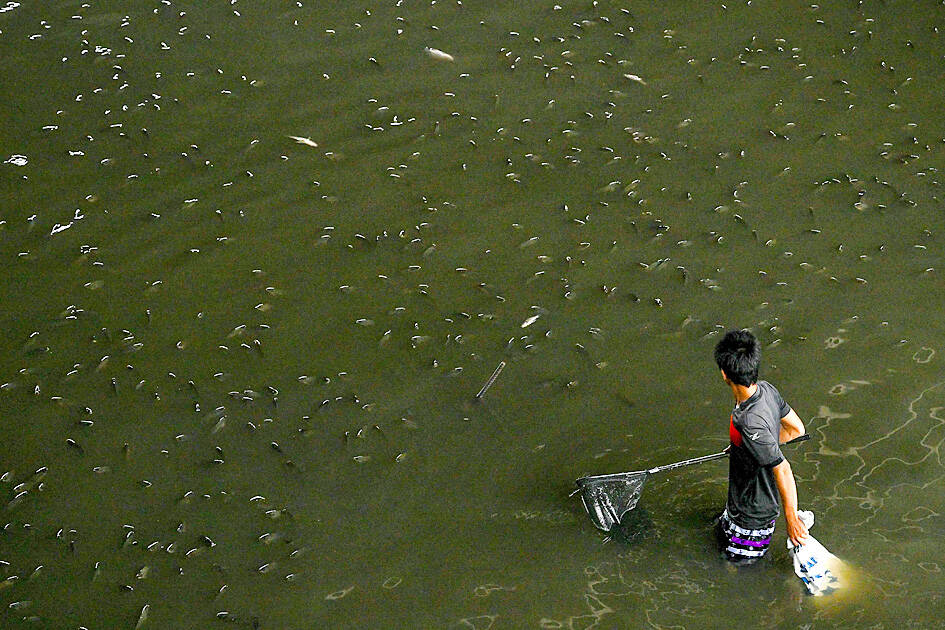Thailand has netted more than 1.3 million kilograms of highly destructive blackchin tilapia fish, the government said yesterday, as it battles to stamp out the invasive species.
Shoals of blackchin tilapia, which can produce up to 500 young at a time, have been found in 19 provinces, damaging ecosystems in rivers, swamps and canals by preying on small fish, shrimp and snail larvae.
As well as the ecological impact, the government is worried about the effect on the kingdom’s crucial fish-farming industry.

Photo: AFP
Fishing authorities caught 1,332,000kg of blackchin tilapia from February to Wednesday last week, said Nattacha Boonchaiinsawat, vice president of a parliamentary committee set up to tackle the spread of the fish.
“We talked to local residents and found out that the spread of tilapia has got worse — they found them in small canals, which was not the case before,” Nattacha said.
The outbreak of tilapia would cost the Thai economy at least 10 billion baht (US$292 million), he said.
The fish, native to West Africa, were first discovered in Thailand’s rivers in 2010 before spreading rapidly in 2018, and are now also found in the US state of Florida and in the Philippines.
In July, the Thai government declared the eradication of the species a national priority and began encouraging people to consume the fish.
Promotional activities in Phetchaburi Province advertised tilapia-based fish sauces and sausages.
Restaurants have also increasingly used the fish in cuisine, fried with garlic or sun-dried.
It remains unclear how the fish arrived in Thailand, but local media reports have said they could have been imported by a company from Ghana in 2010.
A parliamentary investigation is under way to determine the cause of the infestation, Nattacha said.
The Thai government has encouraged locals to catch the fish, offering to pay people 15 baht per kilogram.
It has also designated 75 vending areas around the country where the fish can be sold.
Authorities have released predator species to hunt down the tilapia and are also developing genetically modified blackchin tilapia to produce sterile offspring.
A UN science panel last year warned that the tilapia are spreading faster than ever, wrecking crops, distributing disease and upending ecosystems.
More than 37,000 alien species have taken hold far from their places of origin, costing upwards of US$400 billion a year in damages and lost income, the panel said.

BLOODSHED: North Koreans take extreme measures to avoid being taken prisoner and sometimes execute their own forces, Ukrainian President Volodymyr Zelenskiy said Ukrainian President Volodymyr Zelenskiy on Saturday said that Russian and North Korean forces sustained heavy losses in fighting in Russia’s southern Kursk region. Ukrainian and Western assessments say that about 11,000 North Korean troops are deployed in the Kursk region, where Ukrainian forces occupy swathes of territory after staging a mass cross-border incursion in August last year. In his nightly video address, Zelenskiy quoted a report from Ukrainian Commander-in-Chief Oleksandr Syrskyi as saying that the battles had taken place near the village of Makhnovka, not far from the Ukrainian border. “In battles yesterday and today near just one village, Makhnovka,

HOLLYWOOD IN TURMOIL: Mandy Moore, Paris Hilton and Cary Elwes lost properties to the flames, while awards events planned for this week have been delayed Fires burning in and around Los Angeles have claimed the homes of numerous celebrities, including Billy Crystal, Mandy Moore and Paris Hilton, and led to sweeping disruptions of entertainment events, while at least five people have died. Three awards ceremonies planned for this weekend have been postponed. Next week’s Oscar nominations have been delayed, while tens of thousands of city residents had been displaced and were awaiting word on whether their homes survived the flames — some of them the city’s most famous denizens. More than 1,900 structures had been destroyed and the number was expected to increase. More than 130,000 people

Some things might go without saying, but just in case... Belgium’s food agency issued a public health warning as the festive season wrapped up on Tuesday: Do not eat your Christmas tree. The unusual message came after the city of Ghent, an environmentalist stronghold in the country’s East Flanders region, raised eyebrows by posting tips for recycling the conifers on the dinner table. Pointing with enthusiasm to examples from Scandinavia, the town Web site suggested needles could be stripped, blanched and dried — for use in making flavored butter, for instance. Asked what they thought of the idea, the reply

US Secretary of the Treasury Janet Yellen on Monday met virtually with Chinese Vice Premier He Lifeng (何立峰) and raised concerns about “malicious cyber activity” carried out by Chinese state-sponsored actors, the US Department of the Treasury said in a statement. The department last month reported that an unspecified number of its computers had been compromised by Chinese hackers in what it called a “major incident” following a breach at contractor BeyondTrust, which provides cybersecurity services. US Congressional aides said no date had been set yet for a requested briefing on the breach, the latest in a serious of cyberattacks